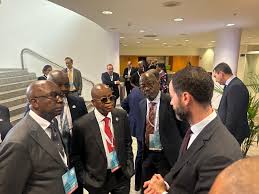Nigeria has officially launched its campaign to be re-elected into the International Maritime Organisation (IMO) Council under Category C for the 2026–2027 term. The event took place at the Delegates’ Lounge of the IMO Headquarters in London and was led by the Minister of Marine and Blue Economy, Adegboyega Oyetola.
The campaign flag-off brought together top maritime leaders from across the globe. The Secretary-General of the IMO, Mr Arsenio Dominguez, was in attendance alongside permanent representatives, alternate representatives, diplomats, and maritime officials from more than 120 IMO member countries. The event served as a strategic platform for Nigeria to remind the international community of its key role in maritime affairs, especially in the Gulf of Guinea region.
While addressing the global audience, Minister Oyetola conveyed warm greetings from President Bola Ahmed Tinubu and officially declared Nigeria’s intention to contest again for a seat on the IMO Council under Category C. He said Nigeria remains a committed and responsible maritime nation that plays a vital role in promoting the IMO’s core values of safe, secure, and sustainable global shipping.
Oyetola described Nigeria’s location on the Gulf of Guinea as both strategic and critical, stressing that the country continues to support efforts aimed at ensuring maritime safety and security in the region. He explained that Nigeria’s active role in regional maritime operations is not only beneficial to West Africa but to global trade routes that rely on smooth shipping through the Gulf.
The Minister used the opportunity to showcase some of Nigeria’s achievements in the maritime sector, including the much-celebrated Deep Blue Project. The Deep Blue Project, coordinated by the Nigerian Maritime Administration and Safety Agency (NIMASA), is Nigeria’s comprehensive maritime security initiative that combines air, land, and sea assets to secure its waterways. According to Oyetola, the project has significantly improved maritime safety and deterred piracy and illegal activities in Nigerian waters.
He also pointed to Nigeria’s recent progress in maritime regulatory reforms. The country has ratified and domesticated several key IMO instruments and is in the process of adopting more conventions. These include those that focus on reducing greenhouse gas emissions from ships, tackling biofouling, and protecting maritime workers under the Maritime Labour Convention.
Oyetola further explained that Nigeria is aligning its shipping policies with international standards in order to remain a reliable partner in global shipping governance. He said the country’s participation in the IMO Council is not just about representing itself, but about contributing positively to decision-making that affects global maritime trade and environmental sustainability.
The Minister also highlighted Nigeria’s large population of over 240 million people, with nearly 60 percent under the age of 19, as a strength in the global maritime conversation. He said this young and vibrant population presents an opportunity for human capital development in the shipping and maritime industries.
He noted that Nigeria has made significant investments in maritime education and training, with institutions like the Maritime Academy of Nigeria in Oron and the Nigerian Navy’s training schools providing platforms for young people to gain skills that are globally relevant.
In closing, Oyetola appealed to IMO member states to support Nigeria’s re-election to the Council, promising that the country would continue to promote inclusive, forward-looking maritime policies that align with global expectations.
Nigeria has been a member of the IMO Council for several years and has used its seat to push for maritime safety, climate change awareness, and the empowerment of seafarers. With this new campaign, the country is seeking to retain its position in the council and continue shaping maritime policies on a global level.
The re-election into the IMO Council is seen as vital for Nigeria to maintain its influence in the international maritime space, especially as it continues to expand its blue economy agenda under President Tinubu’s administration.
